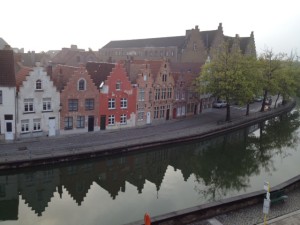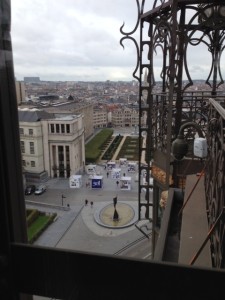
I consider myself bilingual. I speak enough Spanish to navigate most conversations– except maybe ones about law, biotechnology, or porcupines–with native speakers. If I found myself in a situation where people only spoke Spanish, I’d be fine and even make friends. And up until last week, I’ve always traveled to places where people speak either English or Spanish.
Last week, I went to Belgium with little advanced notice. Most people in Belgium speak Dutch or French and sometimes English. I’m not a fan of not knowing the language of the place I’m visiting, but to be fair to me, two weeks was not a lot of time to learn much French.
This was the first time I’ve felt what it might be like to be mute. I was at a loss for words. Despite being an introvert, I can also be a Chatty Cathy. Walking around in Brussels, I carried very few tools in my language box to create meaning. My budget of French words consists of days of the week, numbers 1 through ten, random phrases like “Je suis tres fatigue,” “Je suis un poisson,” and “s’il vous plait.” None of these gets me a glass of white wine. And I’ve been jokingly pronouncing “merci beaucoup” as “mercy buckets” for so long now, well, God help me. And I have no bank of Dutch words that I know of.
I caught myself using every bit of language I know, including scraps of American Sign. Is it obnoxious to ask someone who most likely speaks French or Dutch if they speak Spanish after they deny knowing English? Uh, yes it is.
The reality was I enjoyed being stuck in my head. It calmed me down. When I did use my words, they felt more powerful. I was eager and enthusiastic to get the chance to use what I did know. And everything was more challenging.
One afternoon, while headed back to my apartment, I wandered off the map I was carrying. I knew I was near home but just couldn’t find it, nor could I find my way back onto the map. I literally walked a hole in my shoes as I circled my neighborhood for an hour and a half, determined to find the place on my own. I finally found a woman who spoke some English. After I gave her the street name I needed, she proceeded to write a page of directions that included a transfer on the metro line. Frustrated, I complained, “I just know I’m within walking distance.” She patted me on the back, told me to head to the train station, and wished me luck. Maybe those were all the words she had in her bank of English. Upset, I walked on two more blocks and found my street. Good thing I didn’t get on that train.
In hindsight, not knowing the languages and being able to ask for directions afforded me a chance to see the art nouveau buildings in the Saint Gilles neighborhood while walking off all of the chocolate I had eaten the two days before.

A couple of days later, I wandered into a place where one can happily exist with no words at all: The Museum of Musical Instruments. (If you ever find yourself in Brussels, it’s a must see.) The museum is housed in a beautiful art nouveau building with ornate iron designs at the top. The first few floors contain glass cases of the most unique and normal instruments from all over the world and throughout time. When you enter, you are provided with headphones and a little digital box. As you wander near the instruments in the rooms, the music changes so you can hear what the instruments sound like. No one was speaking and everyone seemed happy and amazed. Music is of course a universal language, transmitting meaning and feelings no matter what language of words you speak. I will go back.
But for now, I’m practicing new French phrases just in case I need French again in the future. Je voudrais un bon vin blanc.

I totally get this. I’m working on French myself because as I have found, Spanish is not enough. (Duolingo is wonderful for this) I don’t know if this happens to you but when someone is speaking a foreign language, be it Chinese, French, etc, I automatically want to start speaking to them in Spanish because that is the language that is foreign in my head. Weird. I remember stopping in Paris and speaking Spanish with people as they spoke French and somehow we managed. I think learning another language gives you an appreciation for all languages including ones with no words at all. Lovely post and well said.
Thank you for your thoughtful reply, Carolyn. I’ve caught myself instinctively defaulting to Spanish just like you described, just anything to communicate, even if it doesn’t make sense for the situation. I embarrassingly spoke Spanish once to a deaf customer at the grocery store I worked in. Pease don’t tell anyone.
I also started using Duolingo for French. It’s a fun app. Sign language is on my todo list. My mother can sign and she is teaching my one-year old neice. It’s adorable. Claire can’t communicate in spoken words yet, but she can sign a few.
Good luck with the French!
So I am not the only one? Good to know. Regarding ASL–that’s awesome. I taught my girls sign language starting around 6 months and it’s amazing how fast they pick it up. It allows them to communicate and reduces tantrums. I was just watching some home videos where Alex was starting to whine and I say–“use your words” and then she signs “Up, please” (She wanted to be picked up) So amazing what babies can grasp! I don’t know a lot of ASL, just the key words you would teach to a baby. I wish I knew more. I don’t know if your niece already watches them or maybe when she gets a little older but Alex loved watching “Signing Time” an educational ASL video series that teaches signing in a very simple yet effective way–it’s really great.